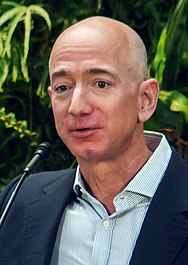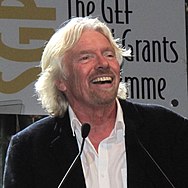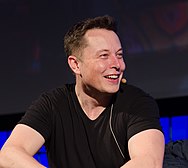The billionaire space race is the rivalry among entrepreneurs who have entered the space industry from other industries - particularly computing. This private spaceflight race involves sending privately developed rockets and vehicles to various destinations in space, often in response to government programs or to develop the space tourism sector.
Today, the billionaire space race is primarily between three billionaires and their respective firms:
- Jeff Bezos's Blue Origin, which is seeking to establish an industrial base in space.
- Richard Branson's Virgin Group (through Virgin Galactic and Virgin Orbit), which seeks to dominate space tourism, low-cost small orbital launch vehicles, and intercontinental sub-orbital spaceflight.
- Elon Musk's SpaceX, which seeks to colonize Mars as well as provide satellite-based internet through its Starlink project.
Prior to his death in 2018, Paul Allen was also a major player in the billionaire space race through the aerospace division of his firm Vulcan and his financing of programs such as Scaled Composites Tier One. Allen sought to reduce the cost of launching payloads into orbit.
Background
The groundwork for the billionaire space race and private spaceflight was arguably laid by Peter Diamandis, an American entrepreneur. In the 1980s, he founded an American national student space society, the Students for the Exploration and Development of Space (SEDS). Later, Jeff Bezos became a chapter president of SEDS. In the 1990s, Diamandis, disappointed with the state of space development, decided to spur it on and spark the suborbital space tourism market, by initiating a prize, the X Prize. This led to Paul Allen becoming involved in the competition, creating the Scaled Composites Tier One platform of SpaceShipOne and White Knight One which won the Ansari X-Prize in 2004. The technology of the winning entrant was then licensed by Richard Branson's Virgin Group as a basis to found Virgin Galactic. The base techniques of Tier One also form the basis for Stratolaunch Systems (formerly of Vulcan Aerospace). Elon Musk's SpaceX was established in 2002, last among the three main rivals. Elon Musk has expressed excitement for a new space race.
Government programs have also fuelled the billionaire space race. NASA programs such as the Commercial Crew Program (created in 2010, with grants mostly won by SpaceX and partially by Blue Origin) and the Artemis HLS program (awarded to SpaceX in 2021 and also to Blue Origin in 2023) have pushed the billionaires to compete against each other to be selected for those multi-billion dollar procurement programs. The competition has also resulted in court battles such as Blue Origin v. United States & SpaceX. Those government programs have provided critical funding for the new private space industry and its development.
Major milestones
- 21 June 2004 – Scaled Composites Tier One, funded by Paul Allen, achieves the first entirely privately funded crewed flight to space (suborbital, crossing the 100 km Kármán line) with the SpaceShipOne flight 15P. The program won the Ansari X Prize later that year.
- 28 September 2008 – SpaceX's Falcon 1 successfully reached low Earth orbit, becoming the first privately-developed launch vehicle to achieve orbital spaceflight.
- 30 May 2020 – SpaceX successfully launches a Falcon 9 rocket carrying the Crew Dragon space capsule during the Demo-2 mission, marking the first privately-developed crewed mission to orbit and to visit the ISS.
- 11 July 2021 – Richard Branson made a successful sub-orbital spaceflight as member of the Virgin Galactic Unity 22.
- 20 July 2021 – Jeff Bezos also made a successful sub-orbital spaceflight aboard Blue Origin's NS-16, becoming the first billionaire space company founder to cross the Karman Line.
- 16 September 2021 – SpaceX operates the Inspiration4 mission, the first orbital spaceflight with only private citizens aboard.
Rivalries
SpaceX vs. Blue Origin
SpaceX and Blue Origin have had a long history of conflict. Blue Origin and SpaceX have had dueling press releases that compete with each other's announcements and events.
SpaceX and Blue Origin battled for the right to lease LC-39A, the rocket launch platform that was used to launch the Apollo Moon missions. SpaceX won the lease in 2013, but Blue Origin filed suit in court against that. It is currently in the hands of SpaceX, while Blue Origin rented SLC-36 instead.
SpaceX filed suit against Blue Origin to invalidate their patent on landing rockets aboard ships at sea. They won their court fight in 2014. SpaceX had been attempting to land rockets at sea since 2014, finally succeeding in 2016, before Blue Origin ever even built a sea-going platform to land rockets onto.
SpaceX and Blue Origin got into a Twitter battle about the meaning of a used rocket, landed rocket, spacerocket, at the end of 2015, when New Shepard successfully landed, after a suborbital jaunt into space. SpaceX had previously launched and landed its Grasshopper rocket multiple times without reaching space. Then SpaceX landed a Falcon 9 first stage, which had been used to launch a satellite into orbit, prompting more Twitter battles at the start of 2016, such as Bezos tweeting "welcome to the club".
In late 2016, Blue Origin announced the New Glenn, directly competing against SpaceX's Falcon Heavy, with a larger rocket but lower payload.
At the 2016 International Astronautical Congress in Guadalajara, Mexico, Blue Origin President Rob Meyerson elaborated on the Bezos vision previously outlined in the New Glenn announcement. The Blue Origin New Armstrong would be similar in function to the SpaceX Interplanetary Transport System that Elon Musk unveiled at the same conference.
In April 2021, SpaceX beat Blue Origin to a 2.9 billion dollar contract to build the lunar lander for NASA's Artemis program. In August 2021, Blue Origin subsequently began a legal case against NASA and SpaceX in the Court of Federal Claims, which was dismissed in November of the same year. About two years later in May 2023 NASA awarded Blue Origin a $3.4 billion contract to develop a competing moon lander, noting that "adding another human landing system partner to NASA’s Artemis program will increase competition, reduce costs to taxpayers, support a regular cadence of lunar landings, further invest in the lunar economy, and help NASA achieve its goals on and around the Moon in preparation for future astronaut missions to Mars."
Blue Origin vs. Virgin Galactic
Blue Origin and Virgin Galactic are in the same market, suborbital space tourism, with the space capsule New Shepard and the spaceplane SpaceShipTwo, respectively. The two systems made their first flights with multiple passengers within 10 days: SpaceShipTwo flew on July 11, 2021 and New Shepard followed on July 20, both carrying their billionaire founders and a few other passengers. As of July 2023, SpaceShipTwo has made three tourism flights with two pilots and four passengers each while New Shepard has made six flights with six passengers each.
Former rivalries
Stratolaunch vs. Virgin Orbit
The Stratolaunch rivalries are no longer part of the billionaire space race, after 2019, having been suspended at the time of Paul Allen's death. The Stratolaunch company has since continued operations under new ownership, but does not focus on orbital space launches anymore.
Vulcan Aerospace subsidiary Stratolaunch Systems planned to air-launch satellite launcher rockets, the same profile as planned by Virgin Orbit for its LauncherOne operations. While LauncherOne was developed and launch aircraft procured (once White Knight Two, now 747 Cosmic Girl), the Scaled Composites "Roc" Model 351 is still being developed (as of 2022) and the rocket to mate to it (the company has refocused away from orbital spaceflight) has yet to be selected. After the death of Paul Allen in 2018, Stratolaunch was sold off, and no longer a billionaire insurgent venture.


